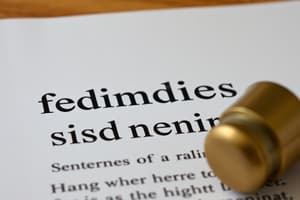Podcast
Questions and Answers
What determines whether theft or fraud is categorized as a misdemeanor or felony?
What determines whether theft or fraud is categorized as a misdemeanor or felony?
- The amount of compensation provided to the victim
- The value of the property stolen and the method of the crime (correct)
- The relationship between the perpetrator and the victim
- The criminal history of the defendant
Which of the following is classified as a felony?
Which of the following is classified as a felony?
- Possessing a small amount of illegal drugs
- Disorderly conduct in public
- Robbery involving the use of force (correct)
- Trespassing on private property
How is the burden of proof in civil cases different from that in criminal cases?
How is the burden of proof in civil cases different from that in criminal cases?
- Civil cases require a higher standard of evidence
- Civil cases need a 99.9% evidence standard
- Criminal cases can be decided with less evidence
- Criminal cases require proof beyond a reasonable doubt (correct)
Which crime would typically be elevated from a misdemeanor to a felony?
Which crime would typically be elevated from a misdemeanor to a felony?
What is a characteristic feature of drug-related crimes?
What is a characteristic feature of drug-related crimes?
What constitutes a felony crime in most states?
What constitutes a felony crime in most states?
Which of the following crimes is classified as a misdemeanor?
Which of the following crimes is classified as a misdemeanor?
Which of the following best describes a summary offense?
Which of the following best describes a summary offense?
Which of the following is NOT considered a crime against the person?
Which of the following is NOT considered a crime against the person?
What is the classification of a crime that involves the intentional destruction of property?
What is the classification of a crime that involves the intentional destruction of property?
Which of the following factors can influence whether a crime is classified as a felony or a misdemeanor?
Which of the following factors can influence whether a crime is classified as a felony or a misdemeanor?
Which crime would likely be classified as a felony due to its serious nature?
Which crime would likely be classified as a felony due to its serious nature?
What defines a petty offense within the misdemeanor classification?
What defines a petty offense within the misdemeanor classification?
Flashcards
Misdemeanor vs. Felony
Misdemeanor vs. Felony
Misdemeanors are less serious crimes, usually punishable by fines or less than a year in jail. Felonies are more serious, resulting in bigger penalties, such as significant fines or more than a year in jail.
Theft/Fraud Crime Severity
Theft/Fraud Crime Severity
The seriousness (misdemeanor or felony) of theft/fraud crimes depends on the value of the stolen item and the crime's method.
Fraud Crime Definition
Fraud Crime Definition
Fraud involves deception to cause financial harm to someone.
Crime Against Public Order
Crime Against Public Order
Signup and view all the flashcards
Criminal Burden of Proof
Criminal Burden of Proof
Signup and view all the flashcards
Felony definition
Felony definition
Signup and view all the flashcards
Misdemeanor definition
Misdemeanor definition
Signup and view all the flashcards
Capital crime
Capital crime
Signup and view all the flashcards
Example of a felony
Example of a felony
Signup and view all the flashcards
Example of a misdemeanor
Example of a misdemeanor
Signup and view all the flashcards
Crime against the person
Crime against the person
Signup and view all the flashcards
Crime against property
Crime against property
Signup and view all the flashcards
Summary/ticketable offense
Summary/ticketable offense
Signup and view all the flashcards
Study Notes
Crime Types and Classifications
- Felonies: Serious crimes punishable by more than one year in prison. Some states consider any crime with a jail sentence a felony. Capital crimes are felonies punishable by death. Common felony examples include murder, rape, burglary, kidnapping, arson, and robbery.
Misdemeanors
- Misdemeanors: Less serious crimes, typically punishable by less than one year in prison or fines. Some states classify any crime leading to only a fine or short jail time as a misdemeanor. Minor offenses like jaywalking may be "petty offenses," a subset of misdemeanors. Common misdemeanors include public intoxication, trespassing, speeding, prostitution, vandalism, and using a false ID. The classification can vary based on aggravating factors like the value of stolen property, for example.
Summary/Ticketable Offenses
- Summary/Ticketable: Offenses punishable by fines and tickets. Repeated convictions of summary offenses can lead to harsher penalties.
Crimes against the Person
- Crimes against the Person: Crimes involving direct harm or force against the victim. Usually the most serious crimes, like murder and rape are felonies, however, less severe crimes like assault without a weapon may be misdemeanors.
Crimes against Property
- Crimes against Property: Crimes that damage or infringe on another's property. Burglary and arson are generally felonies. Criminal mischief ratings (misdemeanor or felony) depend on the damages' value. Criminal trespass is usually a misdemeanor.
Theft and Fraud Crimes
- Theft and Fraud: These crimes involve illegally taking property. Whether a theft or fraud crime is a misdemeanor or felony depends on the stolen property's value and the crime's method. Fraud involves using deception to cause financial harm. Robbery (taking property by force) is a felony.
Crimes against Public Order
- Crimes against Public Order: Crimes that harm the community. Examples include disorderly conduct, public lewdness, prostitution. Crimes are normally misdemeanors, though misdemeanors involving minor children may be elevated to felonies.
Drug-Related Crimes
- Drug-Related Crimes: These involve manufacture, possession, distribution, and sale. Possession of a small amount of illegal drugs is usually a misdemeanor, but large-scale distribution is often a felony.
Civil vs. Criminal Law
- Criminal Law: Violations punishable by fines, imprisonment, and the burden of proof is "beyond a reasonable doubt" (99.9% evidence).
- Civil Law: Disputes between individuals, not involving criminal violations. Burden of proof is "preponderance of the evidence" (50.1% evidence).
Studying That Suits You
Use AI to generate personalized quizzes and flashcards to suit your learning preferences.




